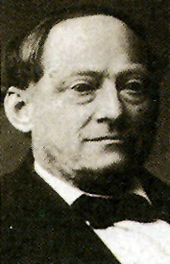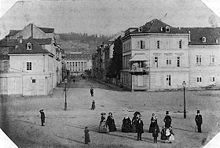Alexander Bachem
Friedrich Wilhelm Alexander Bachem (born January 8, 1806 in Düsseldorf , † February 11, 1878 in Cologne ) was Lord Mayor of Koblenz from 1847 to 1857 and Lord Mayor of Cologne from 1863 to 1875.
biography
Bachem was the son of Neuwied court and government councilor Conrad Joseph Bachem and his wife Elisabeth Helena nee Coenegracht. He attended grammar school in Koblenz and, after graduating from school in September 1825, studied law in Bonn and Heidelberg from 1825 to 1828 . On December 5, 1828, he became an ausculator at the Münster Higher Regional Court . He then worked at the Warendorf Regional and City Court, where he was appointed court trainee on January 18, 1830. In 1833 he became a court assessor and in August 1833 moved to Koblenz in this position. In November 1834 he was transferred to Aachen, but returned to Koblenz in November 1836. In September 1837 he became a district judge at the Ehrenbreitstein Justice Senate and in 1838 a district judge at the Koblenz district court .
Acting as the Lord Mayor of Koblenz
On March 6, 1847, he succeeded Abundius Maehler as Koblenz's Lord Mayor and Police Director. In the first city council meeting he asked King Friedrich Wilhelm IV. For more democratic freedoms in Koblenz. He did not like the fact that the city council only included privileged men who were appointed by the Prussian government.
His merit is the impetus for the construction of the left Rhine route to Koblenz. Bachem also reorganized house numbering . In French times the houses in Koblenz were numbered from 1 to 1210. Now the streets were given names again and were numbered street by street. The first gas-powered street lights were put into operation on September 1, 1847 in the area of the Löhrrondell. On December 20, 1848, a first fire brigade was founded in the city. At the intersection of Hohenzollernstrasse and Markenbildchenweg, the Markenbildchen chapel was inaugurated on July 2, 1851 during his tenure . After the war destruction in 1944, the Madonna and Child were brought to the parish church of St. Joseph .
On March 14, 1847, Bachem founded a 2,000-strong vigilante group , which was armed on March 26, 1848 and which maintained order during the pre-revolutionary period. At the time of the German Revolution of 1848/49 he sympathized with the Red Democrats and even flagged the Koblenz town hall with the republican black, red and gold flag. He supported the Cologne Declaration of May 8, 1849, according to which the Frankfurt National Assembly was still to be regarded as the only authoritative authority in Germany.
Many citizens celebrated him for it, but he came into opposition to the Prussian President of the Rhine Province Hans Hugo von Kleist-Retzow . Although Bachem had now taken on a more moderate role than at the time of the Revolution, the government initiated disciplinary proceedings against him. The proceedings led to his suspension as state police director on October 25, 1851 . Although he was re-elected by the city council, Kleist-Retzow refused to confirm him in office. The advocacy of Princess Augusta , who lives in Koblenz , did not help either. Finally, on April 30, 1857, Bachem resigned and went to the Trier district court .
Acting as the Lord Mayor of Cologne
In February 1858 Bachem moved to the Cologne Court of Appeal as a judge . He was elected mayor of Cologne in 1863. In contrast to his collegial predecessor Hermann Joseph Stupp , Bachem is said to have cultivated a more authoritarian management style in his dealings with city councilors. As a representative of the Prussian state , he found himself in constant dispute with the progressive party , which was strong in Cologne , but showed himself to be conciliatory when it came to direct concerns of the city. In May 1875 he resigned from office.
During Bachem's tenure, the construction of a municipal water supply network, the expansion of the town hall and the establishment of the city's professional fire department took place .
Alexander Bachem died on February 11, 1878 in Cologne and was buried in the Melaten cemetery .
literature
- Horst Romeyk : The leading state and municipal administrative officials of the Rhine Province 1816–1945 (= publications of the Society for Rhenish History . Volume 69 ). Droste, Düsseldorf 1994, ISBN 3-7700-7585-4 , p. 337 .
- Max Bär : From the history of the city of Koblenz. 1814-1914. Krabbensche Buchdruckerei, Koblenz 1922.
- Wolfgang Schütz: Koblenz heads. People from the city's history - namesake for streets and squares ; Publishing house for advertising papers GmbH Mülheim-Kärlich, 2005 2
- Energieversorgung Mittelrhein GmbH (ed.): History of the city of Koblenz . Overall editing: Ingrid Bátori in conjunction with Dieter Kerber and Hans Josef Schmidt
- Vol. 1: From the beginning to the end of the electoral era ; Theiss, Stuttgart 1992; ISBN 3-8062-0876-X
- Vol. 2: From the French city to the present ; Theiss, Stuttgart 1993; ISBN 3-8062-1036-5
- Michael Koelges: The revolution of 1848/49 in Koblenz ; City Archives Koblenz 2008; Chapter 4, p. 2
- Carl Dietmar: The Chronicle of Cologne ; Chronik Verlag, Dortmund 1991; ISBN 3-611-00193-7
Web links
Individual evidence
| personal data | |
|---|---|
| SURNAME | Bachem, Alexander |
| ALTERNATIVE NAMES | Bachem, Friedrich Wilhelm Alexander |
| BRIEF DESCRIPTION | German lawyer, Mayor of Cologne |
| DATE OF BIRTH | January 8, 1806 |
| PLACE OF BIRTH | Dusseldorf |
| DATE OF DEATH | February 11, 1878 |
| Place of death | Cologne |


